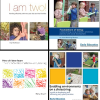The tenth early years minister in ten years, Kelly Tolhurst, is now in post. It’s good news that early years is part of a Minister of State’s portfolio rather than given to a more junior post. However, the rest of her brief is extensive, leaving a risk that early years is not a priority. We hope that she’ll find sufficient time to really get to know the sector, including the often hidden work practitioners do supporting children and families. What should be her priorities for the early years?
The importance of childhood
We welcome the fact that her title is “Minister for schools and childhood” – childhood, not childcare. This is an interesting change of language for the Department for Education. We hope it means recognition of the importance of ensuring all children are safe and happy in the present. Too often, government policy just involves a constant drive to get them ready for the next stage. With the long shadow of Covid impacting on children for years to come, children’s health and development have been hugely impacted. The pressures on support services are compounding the problems. The cost of living crisis will mean more parents struggle to keep their children fed, clothed and warm. Is it time for universal free meals in early years as well as in schools?
Quality
The minister takes office as two consultations are under consideration. The first includes hugely controversial proposals to increase ratios for 2-year-olds. Her predecessor Liz Truss, originator of the last failed attempt to change ratios and now prime minister, has emphasised that government wants to deregulate and bring down the cost of childcare. That may leave Ms Tolhurst under pressure to bring in changes which parents and practitioners strongly oppose. As a sector we need to help government understand how to spend smarter on the early years. They should avoid cutting corners in a way that will only impact negatively on quality, with minimal impact on costs in the short-term and an increased cost to the public purse in the medium to long-term.
Funding
The second consultation, on funding, is mainly an administrative tidying (albeit with a welcome uplift in maintained nursery school funding to bring the worst funded a little further back from the brink of closure). However, proposing to redistribute bits of a seriously under-sized cake at a time when costs are rising at their fastest for years, is ducking the real issue. Government either needs to increase the amount of funding or accept that what can be delivered by the funding must be reduced. The obvious area to cut would be Tax Free Childcare, which has had poor take-up and subsidises better off parents. Bringing down the top threshold for the 30 hours entitlement is another option. She should have a look at the Irish government’s new programme which increases core funding to providers in return for an undertaking to freeze fees for parents. Removing the need for cross-subsidy and enforcing the principle of entitlements being free at the point of delivery would benefit parents and be reasonable to ask of providers.
Workforce
While she’s looking at Ireland’s early years policy, she should take note of the new agreement which introduces national minimum wage scales for the early years sector which are higher than the national minimum wage. The current recruitment and retention crisis in England would benefit from a similar approach. Without it, the sector is simply being out-competed for staff by other sectors which pay better.
Ireland also has in place an early years workforce strategy (aiming for a graduate-led workforce by 2028) which is sorely lacking in England. The current investment in CPD for the sector is well meant, but the scatter gun approach of multiple initiatives (experts and mentors, online CPD, a Level 3 SENCO award and an NPQ in Early Years Leadership) does not provide any kind of coherent progression or qualification framework. It also fails to recognise the pressures on the sector which make it hard for settings to provide cover while staff are studying. Meantime, practitioners have no guarantee of improved pay and conditions in return for up-skilling. The stalled progress of the Early Years Teacher route is a clear sign of failure to create meaningful career progression.
A long-term strategy
With ministers coming and going on an annual basis, and funding under pressure, achieving real and meaningful change to the early years sector requires policy to be based on at least a 10-year plan. There are no quick fixes for issues such as market failure in economically disadvantaged areas or workforce recruitment, retention and upskilling. If the minister wants to leave a meaningful legacy from what we may assume will not be a long time in office, putting in place a long-term strategy for the early years might be her best bet.
Beatrice Merrick is Chief Executive of Early Education
















